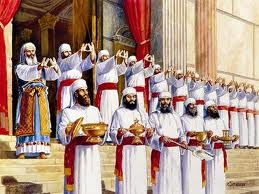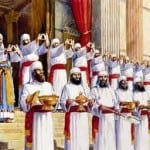“Speak to Aaron and his sons, saying: This is how you should bless the Israelites…” (Num. 6:23)
Rav Kook’s position as chief rabbi of Jaffa and the surrounding settlements was extremely demanding. To rest from the long hours and pressures of his work, Rav Kook would go on vacation in the late summer, staying at the agricultural settlement of Rehovot during the harvest season for grapes.
But even in Rehovot, relaxation was not a simple matter. The local residents were excited to host the revered scholar. They sought out his advice not only in Halachic matters, but also in local administrative issues – tax collection, building local roads, and so forth. And if a Torah subject was raised, Rav Kook became a ma’ayan hamitgaber, an overflowing wellspring of knowledge and creativity, often expounding on a topic for hours.
Guarding over the Rav
Rav Kook would stay in the humble home of the Lipkovitz family. R. Avraham Yitzchak Lipkovitz, who had studied in European yeshivot before making aliyah with his family at age 18, took upon himself to watch over their esteemed guest’s rest and recuperation. He took this duty most seriously, and formulated an appropriate plan. It quickly became clear that at their home and in the synagogue, where Rav Kook was constantly badgered with queries and solicitations, the rabbi could not properly rest.
R. Lipkovitz owned a vineyard, one that produced some of the choicest grapes in the country. In his vineyard he erected a simple hut for Rav Kook’s personal use. Each day, Lipkovitz would lead Rav Kook, riding on a donkey, to the vineyard. And for two hours, Rav Kook would rest in the hut.
Lipkovitz probably thought that the Rav spent this quiet time resting, eating grapes, and reading light material. In fact, Rav Kook’s mind was far away from Rehovot and its plentiful vineyards. His thoughts soarded to the heights of the Torah scholarship of Vilna. He utilized those precious hours of peace and quiet in deep study, composing an erudite commentary to the Vilna Gaon’s glosses on the Shulchan Aruch. This scholarly work, Be’er Eliyahu (‘Elijah’s Well’), elucidates the Gaon’s terse hints and novel thoughts in Halachah and Talmud.
Visitors would frequently arrive from Jaffa or Jerusalem in order to consult with Rav Kook. They were allowed to accompany him on the trip to the vineyard. But once reaching the vineyard, the entrance was barred. R. Lipkovitz gave strict orders to his Arab watchman not to allow any visitors disturb the rabbi’s rest.
Lipkovitz took charge of all aspects of Rav Kook’s rest and recuperation during his stays in Rehovot. He zealously watched over the Rav’s meals and sleep, adamantly preventing anyone from disturbing his sleep, no matter what the occasion.
Rav Kook’s Blessing
R. Lipkovitz was overjoyed with the great privilege of serving Rav Kook during these visits. Yet he had a modest request of the rabbi, a request which he was unable to present for some time. He related:
“Rav Kook stayed at my house, and I very much wanted to receive a blessing from him. But the Rav was always occupied in his Torah learning, or he had visitors, and I dared not interrupt.
“One day I noticed that the Rav had raised his eyes from the sefer he was studying. At the time, I was holding some chickens in my hands. I immediately released the birds and approached the Rav and presented my request.
‘You require a blessing?’ the Rav replied in surprise. ‘After all, you merited to ascend to the Land of Israel and live in the Holy Land in financial comfort.’
‘Nonetheless,’ the Rav continued thoughtfully, ‘I am a kohen; and it is a mitzvah for me to bless the Jewish people at all times.’
Rav Kook blessed his host that he would merit a long life – arichut yamim – until the time of the Redemption.
“From then on,” Lipkovitz remarked, “I lived in tranquility, placing my trust in the scholar’s blessing.”
But after the Six-Day War in 1967, when Jerusalem was liberated and the borders of Israel were expanded, Lipkovitz began to worry. Perhaps the Rav’s blessing has already been fulfilled, and his hour had arrived?
Avraham Yitzchak Lipkovitz in fact lived to be over a hundred years old, passing away in Shvat, 5732 (1972). Over the years, when asked how he had merited such a long life, he would reply with simplicity, “Why, I have a blessing from Rav Kook!”
(Adapted from Chayei HaRe’iyah, pp. 332-337. Shivchei HaRe’iyah, pp. 91-95)

